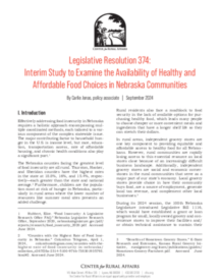Para la versión en español de esta publicación, haga clic aquí.
Effectively addressing food insecurity in Nebraska requires a holistic approach encompassing multiple coordinated methods, each tailored to a various component of the complex statewide issue. The major contributing factor to household hunger in the U.S. is income level, but race, education, transportation access, rate of affordable housing, and chronic health conditions also play a significant part.
The Nebraska counties facing the greatest level of food insecurity are all rural.
Legislative Resolution 374 was introduced to further examine food accessibility in the state, the role of independent grocery stores, and how to best support local grocers to maintain food access in rural communities. This report examines the impact of food insecurity on rural Nebraska and how independent grocery stores are instrumental mechanisms for food access in our state. It also addresses the challenges business owners face, shares how stores impact their communities, and offers policy considerations for providing needed legislative support to increase food security in Nebraska.


